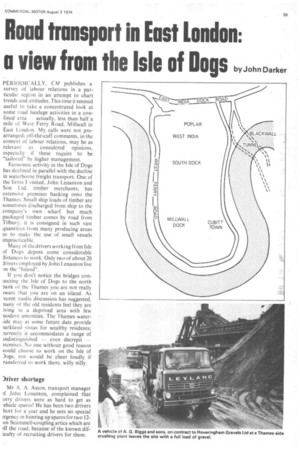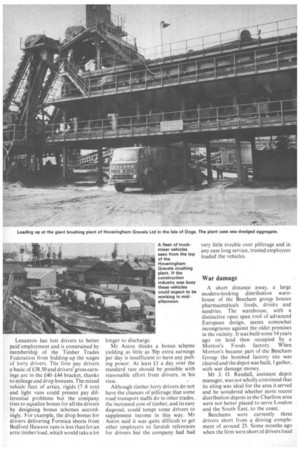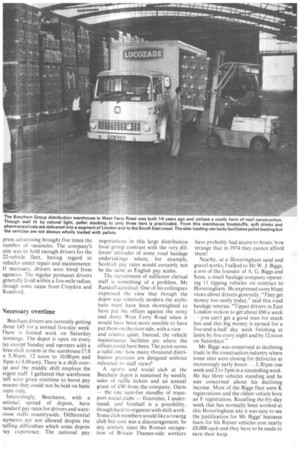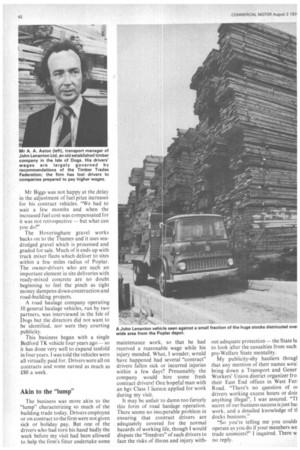Road transport in East London: a view from the Isle of Dogs b„...arker
Page 41

Page 42

Page 43

Page 44

If you've noticed an error in this article please click here to report it so we can fix it.
PERIODICALLY. CM publishes a survey of labour relations in a particular region in an attempt to chart trends and attitudes. This time it seemed useful to take a concentrated look at some road haulage activities in a confined area • actually, less than half a mile of West Ferry Road, Millwall in East London. My calls were not prearranged; off-the-cuff comments, in the context of labour relations, may be as relevant as considered opinions, especially if these require to be "tailored" by higher management.
Economic activity in the Isle of Dogs has declined in parallel with the decline in waterborne freight transport. One of the firms I visited, John Lenanton and Son Ltd. timber merchants, has extensive premises backing onto the Thames. Small ship loads of timber are sometimes discharged from ship to the company's own wharf but much packaged timber comes by road from Tilbury; it is consigned in such vast quantities from many producing areas as to make the use of small vessels impracticable.
Many of the drivers working from Isle of Dogs depots come considerable distances to work. Only two of about 20 drivers employed by John Lenanton live on the "Island".
If you don't notice the bridges connecting the Isle of Dogs to the north sank of the Thames you are not really mare that you are on an island. As -ecent media discussion has suggested, .nany of the old residents feel they arc iving in a deprived area with few riodern amenities. The Thames water;ide may at some future date provide oarkland vistas for wealthy residents; ;urrently it accommodates a range of indistinguished — even decrepit ,remises. No one without good reason vould choose to work on the Isle of Dogs, nor would he cheer loudly if ransferred to work there, willy nilly.
)river shortage
Mr A. A. Aston, transport manager 1 John Lenanton, complained that orry drivers were as hard to get as rehicle spares! He has been two drivers hort for a year and he sees no special irgency in hunting up spares for two 12on Scammell-coupling attics which are if the road, because of the known dificulty of recruiting drivers for them. Lenanton has lost drivers to better paid employment and is constrained by membership of the Timber Trades Federation from bidding-up the wages of lorry drivers. The firm pay drivers a basic of £38.50 and drivers' gross earnings are in the f40-£44 bracket, thanks to mileage and drop bonuses. The mixed vehicle fleet of artics, rigids (7-8 ton) and light vans could present pay differential problems but the company tries to equalize bonus for all the drivers by designing bonus schemes accordingly. For example, the drop bonus for drivers delivering Formica sheets from Bedford Hawson vans is less than for an artic timber load, which would take a lot lVir Aston thinks a bonus scheme yielding as little as 50p extra earnings per day is insufficient to have any pulling power. At least £1 a day over the standard rate should be possible with reasonable effort from drivers, in his view. • • Although timber lorry drivers do not have the chances of pilferage that some road transport staffs do in other trades, the increased cost of timber, and its easy disposal, could tempt some drivers to supplement income in this way. Mr Aston said it was quite difficult to get other employers to furnish references for drivers but the company had had very little trouble over pilferage and in any case long service, trusted employees loaded the vehicles.
War damage
A short distance away, a large modern-looking distribution warehouse of the Beecham group houses pharmaceuticals foods, drinks and sundries. The warehouse, with a distinctive open span roof of advanced European design, seems somewhat incongruous against the older premises in the vicinity. It was built some 14 years ago on land then occupied by a Morton's Foods factory. When Morton's became part of the Beecham Group the bombed factory site was cleared and the depot was built, I gather, with war damage money.
Mr J. 0. Randall, assistant depot manager, was not wholly convinced that its siting was ideal for the area it served and he wondered whether more recent distribution depots in the Charlton area were not better placed to serve London and the South East, to the coast.
Beeehams were currently three drivers short from a driving complement of around 25. Some months ago when the firm were short of drivers local press advertising brought five times the number of vacancies. The company's aim was to hold enough drivers for.the 22-vehicle fleet, having regard to vehicles under repair and maintenance. If necessary, drivers were hired from agencies. The regular permanet drivers generally lived within a five-mile radius, though some came from Croydon and Romford.
ecessary overtime
Beecham drivers are currently getting tbout £45 for a normal five-day week. [here is limited work on Saturday nornings. "the depot is open on every Lay except Sunday and operates with a hree-shift system in the warehouse .(7.0 o 5.30 pm, 12 noon to 10.00 pm and 0 pm to 8.00 am). There is a shift overap and the middle shift employs the argest staff. I gathered that warehouse taff were given overtime to boost pay lecause they could not beheld on basic [ours only.
Interestingly, Beechams, with a iational spread of depots, have tandard pay rates for drivers and ware!Ouse staffs countrywide. Differential ,ayments are not allowed despite the taffing difficulties which some depots lay experience. The national pay negotiations in this large distribution food group contrast with the very different attitudes of some road haulage undertakings where, for example, Scottish pay rates would certainly not be the same as English pay scales.
The recruitment of sufficient clerical staff is something of a problem, Mr Randall admitted. One of his colleagues expressed the view that though the depot was relatively modern the architects must have been shortsighted to have put the offices against the noisy and dusty West Ferry Road when it would have been more sensible to have put them on the riverside, with a view — and relative quiet. Instead, the vehicle maintenance facilities are where the offices could have been. The point seems a valid one: how many thousand distribution premises are designed without reference to staff views?
A sports and social club at the Beecham depot is sustained by weekly sales of raffle tickets and an annual grant of £90 from the company. Darts — the one sure-fire standby of transport social clubs — flourishes, I understand, and football is a possibility, though hard to organize with shift work. Some club members would like a rowing club but cost was a discouragement. In any century since the Roman occupation of Britain Thames-side workers have probably had access to boats; how strange that in 1974 they cannot afford them!
Nearby, at a Hoveringham sand and gravel works, I talked to Mr W. J. Biggs, a son of the founder of A. G. Biggs and Sons, a small haulage company operating 11 tipping vehicles on contract to' Hoveringham. He expressed some blunt views about drivers generally. "They get money too easily today," said this road haulage veteran. "Tipper drivers in East London reckon to get about £60 a week -you can't get a good man for much less and this big money is earned for a five-and-a-half day week finishing at latest by five every night and by 12 noon on Saturdays."
Mr Biggs was concerned at declining trade in the construction industry where some sites were closing for deliveries at increasingly early hours — 3.30 pm one week and 2 to 3 pm in a succeeding week. He has three vehicles standing and he was concerned about his declining income. Most of the Biggs fleet were K registrations and the oldest vehicle bore an F registration. Recalling the 61/2-day week that has normally been worked at this Hoveringham site it was easy to see the justification for Mr Biggs' business fears for his Reiver vehicles cost nearly £8,000 each and they have to be made to earn their keep. Mr Biggs was not happy at the ,delay in the adjustment of fuel price increases for his contract vehicles. "We had to wait a few months and when the increased fuel cost was compensated for it was not retrospective — but what can you do?"
The Hoveringham gravel works backs on to the Thames and it uses seadredged gravel which is processed and graded for sale. Much of it ends up with truck mixer fleets which deliver to sites within a few miles radius of Poplar. The owner-drivers who are such an important element in site deliveries with ready-mixed concrete are no doubt beginning to feel the pinch as tight money dampens down construction and road-building projects.
A road haulage company operating. 10 general haulage vehicles, run by two partners, was interviewed in the Isle of Dogs but the directors did not want to be identified, nor were they courting publicity.
This business began with a single Bedford TK vehicle four years ago — so it has done very well to expand tenfold in four years. I was told the vehicles were all virtually paid for. Drivers were all on contracts and some earned as much as £80 a week.
Akin to the "lump"
The business was more akin to the "lump" characterizing so much of the building trade today. Drivers employea or on contract to the firm were not given sick or holiday pay. But one of the drivers who had torn his hand badly the week before my visit had been allowed to help the firm's fitter undertake some maintenance work, so that he had received a reasonable wage while his injury mended. What, I wonder, would have happened had several "contract" drivers fallen sick or incurred injuries within a few days? Presumably the company would hire some fresh contract drivers! One hopeful man with an hgv Class I licence applied for work during my visit.
It may be unfair to damn too fiercely this form of road haulage operation. There seems no insuperable problem in ensuring that contract drivers are adequately covered for the normal hazards of working life, though I would dispute the "freedom" of such drivers to face the risks of illness and injury with out adequate protection — the State hE to look after the casualties from such pre-Welfare State mentality. My publicity-shy hauliers thougl that any mention of their names woul bring down a Transport and Gener Workers' Union district organizer fro. their East End offices in West Fen Road. "There's no question of oi drivers working excess hours or doir anything illegal", I was assured. "TI secret of our business success is just ha] work, and a detailed knowledge of ti docks business."
"So you're telling me you couldr operate as you do if your members we trade unionists?" I inquired. There w no reply.




























































































